|
|
C.B. Stubblefield:
"Ladies & Gentlemen, I’m a Cook"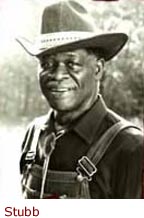
Article
originally appeared in
The Caprock Sun, in April, 1997.
(No byline
appears in the article so I do not know who wrote & compiled
it. The illustrations are added by me as decoration – C.O.)
In 1968, Christopher B. "Stubbs" Stubblefield, Sr.
opened the original 75 seat Stubb’s
Bar-B-Q Restaurant in a small, ramshackle building
at 108 East Broadway. The jukebox was filled with vintage Blues
music. Owing as much to Stubb’s warm smile as to his barbecue
cooking skills, the restaurant soon became the center of Lubbock’s
rich musical community. Throughout the 70’s and 80’s,
the Sunday Jam Sessions became as legendary as the barbecue.
Tom T. 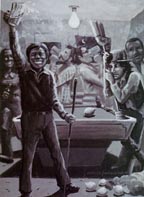 Hall’s
song, "The Great East Broadway
Onion Championship," was written about an
early-morning pool game between Tom and Joe Ely in which an onion
from Stubb’s kitchen was used as a cue ball. Hall’s
song, "The Great East Broadway
Onion Championship," was written about an
early-morning pool game between Tom and Joe Ely in which an onion
from Stubb’s kitchen was used as a cue ball.
Stubb’s died May 27, 1995 and was
buried in Lubbock. The church where his funeral was held
was standing-room only. Represented there was about as diverse
a funeral crowd as Lubbock is likely to ever witness, for color
meant nothing to Stubb when it came to making friends.
Stubbs was more than "just a cook." To his many friends,
family and those who have only heard the stories, C.B. Stubblefield
was an exceptional being. He was another of Lubbock’s legendary
figures whose memory lives on in the hearts of multitudes of
barbecue and music fans everywhere.
Johnny
Hughes came to the Caprock
Sun with an idea to publish some of the stories
people have about Stubb’s. "Stubb’s would sing
‘Summertime’ until it was wintertime," Hughes
said, remembering his friend. These are some stories, some songs,
if you will, that will never die, as they are remembered by some
of his many friends:
Words from
Terry Allen:
"At Stubb’s funeral in Lubbock, the church was full.
Half the congregation was black and half was white. The speakers
were his friends and kin. With Stubb’s, one was the same
as the other. Color didn’t mean anything that day. This
says a lot about the man who was being buried and a lot about
the community he loved…the way he loved it and was loved
back…From the very beginning, his café…was about
good food, good music, and the common dignity of human beings
enjoying being Human in the company of one another. A lot of
black and white people played music with one another on the same
stage for the first time at Stubb’s…a whole lot of
black and white people ate food and listened to that music side-by-side
for the first time at Stubb’s."
Stubb’s
Famous Quotes (submitted by Terry Allen):
- "I was born hungry; I wants to feed the world."
- "Bar-B-Q? Makin’ do with what you got."
- "God born me a black man and I plan to stay that-a-way."
- "They build barb wire fences around old locomotives.
I’ll be damn if they do that to me."
- When asked how he was while in the hospital:
"My Spark plugs ain’t firing, and I got this tornado
loose in my chest."
- "I guarantee you one thing, you ain’t gonna cook
no better than I can. Another thing, you not gonna love people
no better than I can."
A recent
phone call to Austin caught Jesse Taylor freshly home from
his 20th European tour.
These are
his words:
"Did you ever hear the hitchhiking story? I lived on East
Broadway at the top of the hill across from Mackenzie Park. One
day, I was hitching down East Broadway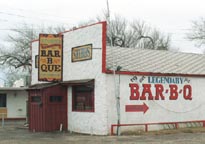 .
Stubbs picked me up. After driving a couple of blocks, he pulled
in at Stubb’s. (Often when walking, I’d catch a glimpse
inside through the open door, and I’d hear the sound of
old Blues music from the jukebox, but I was always reluctant
to go in. I was curious.) .
Stubbs picked me up. After driving a couple of blocks, he pulled
in at Stubb’s. (Often when walking, I’d catch a glimpse
inside through the open door, and I’d hear the sound of
old Blues music from the jukebox, but I was always reluctant
to go in. I was curious.)
"So I said to Stubbs: ‘Wow, you go into this place?’
And he said to me, ‘Sir, I won this place, and I just know
there’s a barbecue sandwich and a cold beer inside that’s
got your name on it.’ What started out as a ride ended up
being a friendship that lasted half a lifetime."
Laughing, Taylor says, "But one of my favorite stories
about Stubbs happened one day when I was sitting at the bar.
Everyone in the place was black except me. In walks this Hispanic
man. He looks at the crowd and then asks Stubbs: ‘You serve
Mexicans here?’
Stubbs eyed the man ominously, then answered: ‘No. We serve
barbecue here.’"
You know, I’m the guy that started live music at Stubb’s
Bar-B-Cue. When I told him I wanted to play music there, he asked
me, ‘What kind of music?’ I told him, ‘Music just
like what’s on your jukebox. I want to play Blues!’
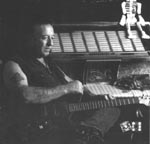 When
Stubbs died, his family gave that jukebox to Jesse Taylor. When
Stubbs died, his family gave that jukebox to Jesse Taylor.
In conclusion, Jesse said, "You
know that sign…the one from the old building that said,
‘THERE WILL BE NO BAD TALK
OR LOUD TALK IN THIS PLACE’?
Well, I’d been hanging around Stubb’s for about 5 years
when I suddenly noticed that there were three words in the sign
stenciled in red and the rest were stenciled in black. The three
red words were ‘bad,’ ‘loud’ and ‘place.’
From that day on, I couldn’t see that sign it didn’t
say to me, ‘BAD LOUD PLACE.’
That’s what that sign said."
She knew
him well.
A story from Carol Kelly Edwards:
I worked with Stubb for almost 4 years. During that time we had
several disagreements, but we always remained best of friends.
When I came back to Lubbock in September of 1987, Stubb would
call me on a regular basis. We continued to keep in touch after
his moved to Austin. As time passed, I realized what a special,
wonderful person Stubbs really was. I also realized what a jerk
I had been to him over the years.
Jerk is a mild description. I can admit that now. That’s
been one of many lessons about my life Stubbs has taught me.
"If you make a mistake, admit it, accept it and then make
better."
Anyway, I called him in late 1990 and I said, "Stubbs, I
just want to apologize for the B--- S--- I said and for everything
I put you through when we worked together."
Stubbs told me, "Ma’am, what in the h--- are you talking
about?" I sensed something in his voice I never sensed before.
I said, "Well, you know Stubbs, when…"
And before I could continue he said, "Now you listen here,
Carol Kelly, I don’t even remember any bad times between
us, and I sure as h--- don’t think about ‘em! When
I think of you, I remember the good times, and that’s what
you need to do, too! The past is the past. We got to go on and
be happy!"
Then he hung up the phone. He just hung up! I sat there looking
at my phone and I knew that after everything he and I had been
through, he was never truly angry with me until that moment.
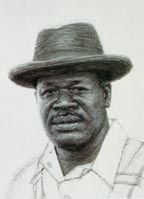 A few stories submitted
by Paul Milosevich: A few stories submitted
by Paul Milosevich:
The Nashville
Trip
One cold February night in 1980, Stubbs came
by my house about midnight. I had seen him a few days earlier
and told him I was delivering some artwork to Johnny Cash in
Nashville. He said he would like to cook up some "cabrito"
for Mr. Cash.
Stubbs showed up in a car I had never seen. He explained that
"somebody named Chuck" loaned it to him for the trip.
It had an 8-track tape player that worked if you wedged in a
book of matches underneath the tape. Stubbs had a shoe box full
of blues tapes and an 8mm movie camera he got at Huber’s
Pawn Shop for $15. "We’re gonna make a movie of this
trip," he said. (The movie camera had film in it with some
footage of a Mexican wedding in Lubbock which was the "lead-in"
to the start of our Nashville trip.)
Climbing into the car, I asked Stubbs if he had a map. He said,
"No."
"Do you know how to get to Nashville?" I wondered.
"I think you go through Benjamin," he smiled.
We hit a lot of barbecue joints between Lubbock and Nashville
and Stubbs was critical of most of it. He liked some we got in
Memphis (Leonard’s) and at a 7-11 in Seymour, Texas.
He told me about being in the Korean Conflict, driving a truck
down a steep hill one night during a blackout, "We had to
go over this rickety wooden bridge," he said. "Nobody
knew if it would hold our trucks. Paul, it was dark as this,"
he said, turning off the lights. Stubbs drove about 80mph, generally,
and he finished the Korean story hurtling through the blackness
somewhere around Texarkana.
(Stubb did cook cabrito for Johnny Cash, slept in Jimmy Carter’s
bed at Tom T. Hall’s place, was invited backstage at Opryland
and the $15 movie camera worked fine.)
Another Road Trip
One winter Stubbs was driving up to Lubbock
from Austin. It was warm when he left Austin, so he wasn’t
worried that his heater wasn’t hooked up. A "blue norther"
caught him around Sweetwater. The windshield frosted over and
his feet and hands started to get numb. Again, it was about 3
am, his favorite time to drive. Stubb’s stopped at a 7-11,
bought a dozen candles, lit them and spread them out across the
dashboard. It must have been an eerie sight to other motorists
that night, seeing this long sedan creeping down the highway
with a black man peering out through a row of candles. "I
had to stop 3 or 4 times to get more candles before I made it
Lubbock," Stubb explained.
Short Shots
from the Milosevich collection:
- Stubbs referred to me as "Paul Milaka, my art consoler.
He draws with charcoal and I cooks with it."
- One of Stubb’s young friends offered him a ride to Albuquerque
in her small compact car. "I think it was a Hunda,"
Stubbs said. "I felt like King Kong in a cee-gar box.
- "Talking about a ‘high society’ woman he knew,
Stubbs described her as coming "from a very permanent family
here in Lubbock."
- Stubbs was a charmer, no question about it. An insurance
salesman had a meeting with Stubb in the kitchen of our Santa
Fe house. He started explaining different policies to Stubbs
and I excused myself. When I came back about an hour later, the
insurance man had his checkbook out and was asking, "How
much do you need, Stubbs?"
- A young Lubbock preacher wanted to know Stubb’s thoughts
on our society’s current problems. Stubbs said, "It’s
like that John Wayne movie. We’re out of control, like a
cattle stampede. Somebody needs to ride out to the front of the
herd and turn that leadin’ steer."
From Lloyd
Maines:
Stubbs enjoyed giving of himself. He was totally unselfish. He
usually called me about once a month from Austin to tell me about
his latest idea to promote a concert. Stubbs had great taste
in music, but some of the great old Blues players that he booked
didn’t quite have the drawing power to get big crowds, so
Stubb would usually lose a lot of money.
Losing the money never seemed to ruin the moment for Stubbs.
He would always sat it was the best show he’d ever seen.
Stubbs had no use for greedy people, and he could smell them
a mile away. Stubbs was an important person in the shaping of
the music scene in West Texas and Austin. I miss his smile and
his strong sense of being.
Mike Pritchard
had a driving story:
Tiffany and I were out at Stubb’s one night not long after
we got married. We were talking way into the night, in fact,
it was around 4 a.m. when we started to leave. The van wouldn’t
start. We stepped back inside and Stubbs offered to give us a
ride home.
We left Stubb’s Bar-B-Que headed west on Broadway. Stubbs
must have driven 60mph all the way, and that old Cadillac never
slowed down for a red light or a stop sign. By the time we got
to out house on 21st and University, the color had completely
left our faces! Stubbs pulled into our drive and, noticing the
looks of sheer terror in our eyes, tried to reassure us. Smiling,
he said, "The Lord always takes care of me." And off
he went into the darkness of a very early morning, leaving the
tow of us kissing the ground as we found our way to the door.
These are just a few of the stories. There are many more tales
around that remind us of a man known and loved by many. Our friend
is gone. The Bar-B-Que joint at 108 East Broadway has long since
been leveled. This is our tribute to Stubb, our way of saying,
"Stubbs, you may have gone before us, but you really never
left our hearts."
The Caprock Sun supports
the efforts of the Lubbock Arts Alliance and everyone involved
in the Stubbs Memorial Project. Give what you can to make this
memorial a reality. It is our opportunity to give something back
to the man who gave Lubbock the best he had to offer:
He was a cook.
Caprock Sun,
April 1997, pp. 8-9
Return to
Stories or Home
|



